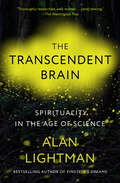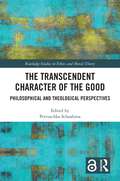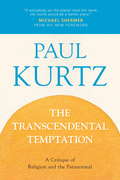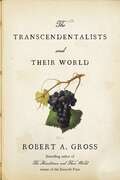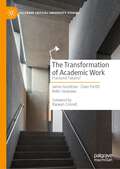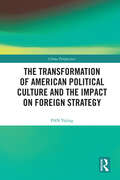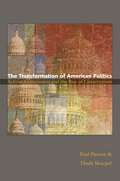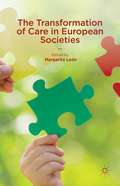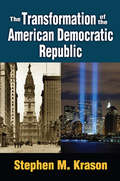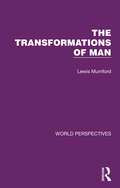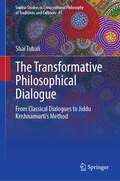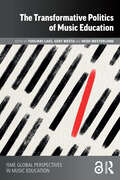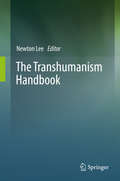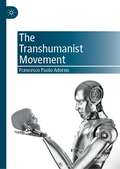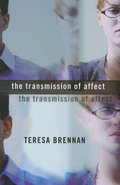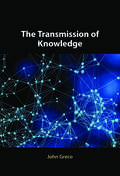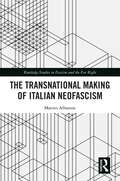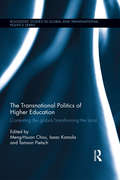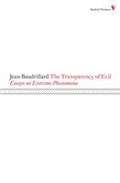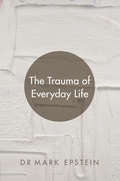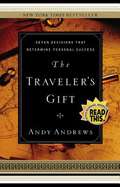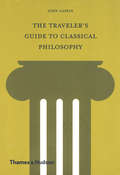- Table View
- List View
The Transcendent Brain: Spirituality in the Age of Science
by Alan LightmanFrom the acclaimed author of Einstein&’s Dreams comes a rich, fascinating answer to the question, Can the scientifically inclined still hold space for spirituality? &“Lightman…belongs to a noble tradition of science writers, including Oliver Sacks and Lewis Thomas, who can poke endlessly into a subject and…stir up fresh embers of wonder.&” —The Wall Street JournalGazing at the stars, falling in love, or listening to music, we sometimes feel a transcendent connection with a cosmic unity and things larger than ourselves. But these experiences are not easily understood by science, which holds that all things can be explained in terms of atoms and molecules. Is there space in our scientific worldview for these spiritual experiences? According to acclaimed physicist and novelist Alan Lightman, there may be. Drawing on intellectual history and conversations with contemporary scientists, philosophers, and psychologists, Lightman asks a series of thought-provoking questions that illuminate our strange place between the world of particles and forces and the world of complex human experience. Can strict materialism explain our appreciation of beauty? Or our feelings of connection to nature and to other people? Is there a physical basis for consciousness, the most slippery of all scientific problems? Lightman weaves these investigations together to propose what he calls &“spiritual materialism&”— the belief that we can embrace spiritual experiences without letting go of our scientific worldview. In his view, the breadth of the human condition is not only rooted in material atoms and molecules but can also be explained in terms of Darwinian evolution. What is revealed in this lyrical, enlightening book is that spirituality may not only be compatible with science, it also ought to remain at the core of what it means to be human.
The Transcendent Character of the Good: Philosophical and Theological Perspectives (Routledge Studies in Ethics and Moral Theory)
by Petruschka SchaafsmaThis volume addresses issues of moral pluralism and polarization by drawing attention to the transcendent character of the good. It probes the history of Christian theology and moral philosophy to investigate the value of this idea and then relates it to contemporary moral issues. The good is transcendent in that it goes beyond concrete goods, things, acts, or individual preferences. It functions as the pole of a compass that helps orient our moral life. This volume explores the critical tension between the transcendent good and its concrete embodiments in the world through concepts like conscience, natural and divine law, virtue, and grace. The chapters are divided into three parts. Part I discusses metaphysical issues like the realist nature and the unity of the good in relation to philosophical, naturalist, and theological approaches from Augustine to Iris Murdoch. The chapters in Part II explore issues about knowing the transcendent good and doing good, exemplified in the delicate balance between divine command and human virtuousness. Early Protestant theological views prove to be excellent interlocutors for this reflection. Finally, Part III focuses on how transcendence is at stake in two heavily debated moral issues of today: euthanasia and the family. The Transcendent Character of the Good will be of interest to scholars and advanced students working in theological ethics, moral philosophy, and the history of ethics. The Open Access version of this book, available at www.taylorfrancis.com, has been made available under a Creative Commons Attribution-Non Commercial-No Derivatives 4.0 license.
The Transcendental Temptation
by Paul KurtzA landmark work. Mandatory reading for anyone who wants to learn to be a good skeptic.In this widely acclaimed and highly controversial book, Paul Kurtz examines the reasons why people accept supernatural and paranormal belief systems in spite of substantial evidence to the contrary. According to the author, it is because there is within the human species a deeply rooted tendency toward magical thinking - the "transcendental temptation" - which undermines critical judgment and paves the way for willful beliefs. He explores in detail the three major monotheistic religions - Judaism, Christianity, and Islam - finding striking psychological and sociological parallels between these religions, the spiritualism of the 19th century, and the paranormal belief systems of today. There are sections on mysticism, belief in the afterlife, the existence of God, reincarnation, astrology, and ufology. Kurtz also explains the nature of skepticism as an antidote to belief in the transcendental.From the Trade Paperback edition..
The Transcendentalists and Their World
by Robert A. GrossWhy Concord? How did a small and seemingly quiet village in the hinterlands of Boston become, by popular reckoning, the birthplace of two revolutions--the American War of Independence that began with shots fired by the local Minutemen, and the American Renaissance of literature and thought that began with the Transcendentalists' challenge to established pieties? In The Transcendentalists and Their World, the distinguished historian Robert A. Gross gives a rich and beautifully detailed account of the town that Ralph Waldo Emerson, Henry David Thoreau, Nathaniel Hawthorne, and the Alcotts called home. Their Concord, he shows, was primed for revolt, and was hardly a sleepy, bucolic place fit only for poets and philosophers. The Transcendentalists and their neighbors lived in an age of transformation. A place of more than two thousand souls in the antebellum era, Concord was a community in ferment, one whose small, ordered society, founded by Puritans and defended by Minutemen, was dramatically unsettled by the expansive forces of capitalism and democracy while the town became more tightly integrated with the wider world. These changes posed a challenge to a society built on inherited institutions and involuntary associations as citizens placed a new premium on autonomy and choice. Concord was ripe for Emerson and Thoreau. This book is both an intimate journey into the life of a town and a searching cultural study of major American writers as they plumbed the reaches of the universe for spiritual truths--and took stock of the rapidly changing contours of their surroundings. It shows us familiar literary figures alongside their neighbors--white and Black, devout and blasphemous, and situated at every level of the social order--and it reveals how this common life in Concord entered powerfully into their works. No American community has been recovered so richly and located so meaningfully within the larger American story. ROBERT A. GROSS is the James L. and Shirley A. Draper Professor of Early American History Emeritus at the University of Connecticut. He is the author of The Minutemen and Their World (1976), which won the Bancroft Prize, and of Books and Libraries in Thoreau's Concord (1988); with Mary Kelley, he is the coeditor of An Extensive Republic: Print, Culture, and Society in the New Nation, 1790-1840 (2010). A former assistant editor of Newsweek, he has written for such periodicals as Esquire, Harper's Magazine, The Boston Globe, and The New York Times, and his essays have appeared in The American Scholar, The New England Quarterly, Raritan, and The Yale Review.
The Transformation of Academic Work: Fractured Futures? (Palgrave Critical University Studies)
by James Goodman Keiko Yasukawa Claire ParfittThis book offers a unique grounded analysis of recent crises and transformations in academic work. It charts international and Australia-based efforts to overcome academic fragmentation and precarity, and to advance agendas for the public university. It is based on extensive qualitative interviews with academics and managers across several universities in Australia. It finds new grounds for ‘universal’ universities, with decent jobs, to serve the public good. The book is aimed at students and scholars from sociology, education, politics and industrial relations, and a wider readership concerned about the future of universities. Analysis centres on a trade union-led initiative in Australia aimed at decasualising universities, and ensuing debates about the impact of academic fragmentation. The authors argue for strengthening the teaching/research nexus as the foundation-stone for public purpose universities.
The Transformation of American Political Culture and the Impact on Foreign Strategy (China Perspectives)
by PAN YalingThis book examines the interplay between political culture and diplomatic strategy in the U.S., revealing the transformation of American political culture and its impact on the country's foreign strategy. The theoretical pivot of this study is an analysis of the dynamics of political culture and the mechanisms of the interaction between political culture and diplomatic strategy. Given this premise, the core chapters revisit the historical transformations of American political culture and analyze the responses and countermeasures taken to attempt to reverse the perceived decline in American hegemony during the presidencies of George W. Bush, Barack Obama, and Donald Trump, factors interwoven with security, economic, and institutional crises. The discussion describes the landscape and evolution of contemporary American political culture and the correlated adjustments of U.S. global strategy over the course of the twenty first century. Given the myriad of challenges and political legacies left by its predecessors, the author gives a pessimistic prognosis of the prospect of resolving America's political plight by the Joe Biden administration. The title will be a valuable reference for academic and general readers interested in American politics, U.S. diplomatic strategy, and international relations.
The Transformation of American Politics: Activist Government and the Rise of Conservatism (Princeton Studies in American Politics: Historical, International, and Comparative Perspectives #94)
by Paul Pierson and Theda SkocpolThe contemporary American political landscape has been marked by two paradoxical transformations: the emergence after 1960 of an increasingly activist state, and the rise of an assertive and politically powerful conservatism that strongly opposes activist government. Leading young scholars take up these issues in The Transformation of American Politics. Arguing that even conservative administrations have become more deeply involved in managing our economy and social choices, they examine why our political system nevertheless has grown divided as never before over the extent to which government should involve itself in our lives. The contributors show how these two closely linked trends have influenced the reform and running of political institutions, patterns of civic engagement, and capacities for partisan mobilization--and fueled ever-heightening conflicts over the contours and reach of public policy. These transformations not only redefined who participates in American politics and how they do so, but altered the substance of political conflicts and the capacities of rival interests to succeed. Representing both an important analysis of American politics and an innovative contribution to the study of long-term political change, this pioneering volume reveals how partisan discourse and the relationship between citizens and their government have been redrawn and complicated by increased government programs. The contributors are Andrea Louise Campbell, Jacob S. Hacker, Nolan McCarty, Suzanne Mettler, Paul Pierson, Theda Skocpol, Mark A. Smith, Steven M. Teles, and Julian E. Zelizer.
The Transformation of Care in European Societies
by Margarita LeónThis book aims to explore the nature and extent of the 'care deficit' problem in European societies and how effective the different care systems are in dealing with these problems through policy innovation. It combines theoretical and conceptual debates, cross-national comparisons and analytically-driven case studies.
The Transformation of Mathematics in the Early Mediterranean World: From Problems to Equations
by Reviel NetzThe transformation of mathematics from its ancient Greek practice to its development in the medieval Arab-speaking world is approached by focusing on a single problem proposed by Archimedes and the many solutions offered. From a practice of mathematics based on the localized solution (originating in the polemical practices of early Greek science), we see a transition to a practice of mathematics based on the systematic approach (grounded in the deuteronomic practices of Late Antiquity and the Middle Ages). A radically new interpretation is accordingly offered of the historical trajectory of pre-modern mathematics.
The Transformation of the American Democratic Republic
by Stephen M. KrasonIn this stimulating volume, Stephen M. Krason considers whether the Founding Fathers' vision of the American democratic republic has been transformed and if so, in what ways. He looks to the basic principles of the Founding Fathers, then discusses the changes that resulted from evolving contemporary expectations about government. Referencing philosophical principles and the work of great Western thinkers, Krason then explores a variety of proposals that could forge a foundation for restoration.Acknowledging that any attempt to revive the Founders' views on a democratic republic must start in the public sphere, Krason focuses on concerned citizens who are aware of the extent to which our current political structures deviate from the Founders' vision and want to take action. Ultimately, a democratic republic can exist, be sustained, and flourish only when there is a deep commitment to it in the minds and norms of its people.Written by a foremost authority in the field of US Constitutional law, this book will appeal to those interested in American history, society, and politics.
The Transformation of the American Democratic Republic
by Stephen M. KrasonIn this stimulating volume, Stephen M. Krason considers whether the Founding Fathers' vision of the American democratic republic has been transformed and if so, in what ways. He looks to the basic principles of the Founding Fathers, then discusses the changes that resulted from evolving contemporary expectations about government. Referencing philosophical principles and the work of great Western thinkers, Krason then explores a variety of proposals that could forge a foundation for restoration.Acknowledging that any attempt to revive the Founders' views on a democratic republic must start in the public sphere, Krason focuses on concerned citizens who are aware of the extent to which our current political structures deviate from the Founders' vision and want to take action. Ultimately, a democratic republic can exist, be sustained, and flourish only when there is a deep commitment to it in the minds and norms of its people.Written by a foremost authority in the field of US Constitutional law, this book will appeal to those interested in American history, society, and politics.
The Transformations of Man (World Perspectives #7)
by Lewis MumfordOriginally published in 1957, this volume compares the 20th Century transformation of human life to the revolution which swept early man into the first civilized communities. It shows how each radical new stage of human development grew out of changes in human personality and consciousness, such as the invention of language and symbols, the origins of universal religions and the mechanization of everyday life. Despite the threat that the author foresees from an over-reliance on automation, the book maintains that humanity still has the means, spiritual, personal and technological to create a sustainable future for itself, by increasing the usefulness and freedom of all men.
The Transformative Mind
by Anna StetsenkoThe book suggests a transition from a relational worldview premised on the socio-political ethos of adaptation towards a transformative worldview premised on the ethos of solidarity and equality. Expansively developing Vygotsky's revolutionary project, the Transformative Activist Stance integrates insights from a vast array of critical and sociocultural theories and pedagogies and moves beyond their impasses to address the crisis of inequality. This captures the dynamics of social transformation and agency in moving beyond theoretical and political canons of the status quo. The focus is on the nexus of people co-creating history and society while being interactively created by their own transformative agency. Revealing development and mind as agentive contributions to the 'world-in-the-making' from an activist stance guided by a sought-after future, this approach culminates in implications for research with transformative agendas and a pedagogy of daring. Along the way, many key theories of mind, development and education are challenged and radically reworked.
The Transformative Philosophical Dialogue: From Classical Dialogues to Jiddu Krishnamurti’s Method (Sophia Studies in Cross-cultural Philosophy of Traditions and Cultures #41)
by Shai TubaliThis book explores dialogue as a transformative form of philosophical practice by unveiling the method behind the unique dialogue developed by mystic and thinker Jiddu Krishnamurti (1895–1986). While Krishnamurti himself generally rejected the cultivation of systems and techniques, Shai Tubali argues that there are easily identifiable patterns through which Krishnamurti strove to realize his dialogical aims. For this reason, he refers to this method, whose existence has evaded Krishnamurti’s followers and scholars alike, as the Krishnamurti dialogue. He suggests that these discursive patterns serve to broaden our understanding of the possibilities of philosophical and religious dialogues and further illuminate established forms of dynamic discourse, such as the Socratic method. Inspired by Pierre Hadot’s revolutionary reading of the classical Greco-Roman texts, the author centers his attention on Plato’s Socratic dialogues and the guru–disciple conversations in the Hindu Upanishads, which fall within the scope of what may be termed ‘the transformative dialogue’: dialogues that have been written with the intention of bringing about a transformation in the mind of the interlocutor and reader and reorienting their way of life. This text appeals to students as well as researchers and suggests that the Krishnamurti dialogue is not only a continuation and development of the transformative dialogue, but that it also amalgamates ingredients of classical Western philosophy and South Asian mysticism. Moreover, this type of dialogue encourages readers to revisit the lost practice of transformative philosophy, in that it reveals new pathways of philosophical and religious inquiry that bear thought-provoking practical implications.
The Transformative Politics of Music Education (ISME Series in Music Education)
by Gert Biesta Heidi Westerlund Tuulikki LaesThis book introduces a unique approach to the interconnections between music education and politics. By taking a broader, more diverse, and explicitly ethico-political philosophical and theoretical stance, the book challenges institutional and structural conditions that may be resistant to change and expands the understanding of the professional responsibility of music educators in the 21st century to meet a variety of societal and ecological challenges.Emerging from a collaboration between international music education scholars and prominent contemporary educational theorist Gert Biesta, this book connects contemporary educational theories with music education to unlock its transformational capacity. In eight chapters, the contributors show how music education can move towards ways of being and doing that are attuned to social justice and to the broader social and ecological responsibility of music professionals. Strengthening the interdisciplinary connections between music education and education, philosophy, sociology, policy, systems thinking, and more, the volume offers a renewed vision of the scope and boundaries of both music teacher education and professional work in music more widely.Connecting the decades-long work of internationally established music educator scholars and ideas from large-scale research projects with a shared interest in transformative theorisation, this book fills a knowledge gap and reframes the philosophy of music education as a vibrantly multidisciplinary, theory-generating field. Relevant to researchers and students across music teacher education and performance studies, this book speaks to both conservatoires and university contexts across Europe and North America, helping us unlock the transformative capacity of music education.
The Transhumanism Handbook
by Newton LeeModern humanity with some 5,000 years of recorded history has been experiencing growing pains, with no end in sight. It is high time for humanity to grow up and to transcend itself by embracing transhumanism. Transhumanism offers the most inclusive ideology for all ethnicities and races, the religious and the atheists, conservatives and liberals, the young and the old regardless of socioeconomic status, gender identity, or any other individual qualities. This book expounds on contemporary views and practical advice from more than 70 transhumanists. Astronaut Neil Armstrong said on the Apollo 11 moon landing in 1969, “One small step for a man, one giant leap for mankind.” Transhumanism is the next logical step in the evolution of humankind, and it is the existential solution to the long-term survival of the human race.
The Transhumanist Movement
by Francesco Paolo AdornoThe book is published as part of the "PRIN 2017 The Dark side of the Law".This volume analyzes the theoretical underpinnings of the academic transhumanism movement, beginning with the relationship between anthropology and technique. The author focuses on the question of immortality, which can be considered the core of transhumanism. The true depth of immortality will be discussed, through which and how many transformations could be produced in order to change our society, which is basically shaped by and for human mortal beings, in a society composed by immortal persons. Some writers have written about what a future populated with immortals might look like, which is far removed from both the bright future painted by transhumanists and from the disappearance of humanity feared by bioconservatives.
The Transmission of Affect
by Teresa BrennanThe idea that one can soak up someone else's depression or anxiety or sense the tension in a room is familiar. Indeed, phrases that capture this notion abound in the popular vernacular: "negative energy," "dumping," "you could cut the tension with a knife." The Transmission of Affect deals with the belief that the emotions and energies of one person or group can be absorbed by or can enter directly into another. The ability to borrow or share states of mind, once historically and culturally assumed, is now pathologized, as Teresa Brennan shows in relation to affective transfer in psychiatric clinics and the prevalence of psychogenic illness in contemporary life. To neglect the mechanism by which affect is transmitted, the author claims, has serious consequences for science and medical research. Brennan's theory of affect is based on constant communication between individuals and their physical and social environments. Her important book details the relationships among affect, energy, and "new maladies of the soul," including attention deficit disorder, chronic fatigue syndrome, codependency, and fibromyalgia.
The Transmission of Knowledge
by John GrecoHow do we transmit or distribute knowledge, as distinct from generating or producing it? In this book John Greco examines the interpersonal relations and social structures which enable and inhibit the sharing of knowledge within and across epistemic communities. Drawing on resources from moral theory, the philosophy of language, action theory and the cognitive sciences, he considers the role of interpersonal trust in transmitting knowledge, and argues that sharing knowledge involves a kind of shared agency similar to giving a gift or passing a ball. He also explains why transmitting knowledge is easy in some social contexts, such as those involving friendship or caregiving, but impossible in contexts characterized by suspicion and competition rather than by trust and cooperation. His book explores phenomena that have been undertheorized by traditional epistemology, and throws new light on existing problems in social epistemology and the epistemology of testimony.
The Transnational Making of Italian Neofascism (Routledge Studies in Fascism and the Far Right)
by Matteo AlbaneseThis book delves into the evolution of Italian neo-fascism from the end of World War II to the mid-1970s.It examines the transition from historical fascism to neo-fascism, highlighting the survival and adaptation of fascist ideologies within democratic frameworks. This book explores the formation and development of the Italian Social Movement (MSI) and the broader neo-fascist network, emphasising its transnational connections and ideological persistence. Key themes include the escape and reorganisation of former fascists, their influence on post-war Italian politics, and the cultural and ideological debates within the neo-fascist movement. The work also addresses the role of race, anti-communism, and the strategic alliances formed during the Cold War. By tracing the historical and ideological continuities, this book provides a comprehensive understanding of neo-fascism's enduring impact on Italian and global political landscapes.It will be of interest to students and scholars of fascism, political history, and Italian politics.
The Transnational Politics of Higher Education: Contesting the Global / Transforming the Local (Routledge Studies in Global and Transnational Politics)
by Tamson Pietsch Meng-Hsuan Chou Isaac KamolaThis edited volume introduces readers to the relationship between higher education and transnational politics. It shows how higher education is a significant arena for regional and international transformation as well as domestic political struggle replete with unequal power relations. This volume shows: The causes and impacts of recent transformations in higher education within a transnational context; Emerging similarities in objectives, institutional set-ups, and approaches taking place within higher education institutions across different world regions; The asymmetrical relations between various kinds of institutional, commercial and state actors across borders; The extent to which historical and colonial legacies are important in the transformation of higher education; The potential effects these developments have on the current structure of international political order. Drawing on case studies from across the Middle East, Asia, Africa, Latin America, and Europe, the contributors develop diverse perspectives explaining the impact of transnational politics on higher education—and higher education on transitional politics—across time and locality. This book is among the first multi-disciplinary effort to wrestle with the question of how we can understand the political role of higher education, and the political force universities exert in the realm of international relations.
The Transparency Of Evil: Essays On Extreme Phenomena (Radical Thinkers)
by Jean Baudrillard James BenedictIn this, his most important collection of essays since Le systeme des objets, Jean Baudrillard contemplates Western culture “after the orgy”—the orgy, that is, of the revolutions of the 1960s. The sexual revolution has led, he argues, not to sexual liberation but to a reign of transvestism, to a confusion of the categories of man and woman—to the “androgenous and Frankenstein appeal of a Michael Jackson.” The revolution in art has led to a “transaesthetic realm of indifference.” The cybernetic revolution has blurred the distinction between man and machine, while the political revolution has led to a ‘transpolitics’ that merely simulates old political forms. Such are the points of Baudrillard’s compass as he steers his way through the mental landscape of this febrile fin de siecle.
The Trauma of Everyday Life
by Dr EpsteinTrauma does not just happen to a few unlucky people; it is the bedrock of our psychology. Death and illness touch us all, but even the everyday sufferings of loneliness and fear are traumatic. In The Trauma of Everyday Life renowned psychiatrist and author of Thoughts Without a Thinker Mark Epstein uncovers the transformational potential of trauma, revealing how it can be used for the mind's own development. Epstein finds throughout that trauma, if it doesn't destroy us, wakes us up to both our minds' own capacity and to the suffering of others. It makes us more human, caring and wise. It can be our greatest teacher, our freedom itself, and it is available to all of us.Western psychology teaches that if we understand the cause of trauma, we might move past it while many drawn to Eastern practices see meditation as a means of rising above, or distancing themselves from, their most difficult emotions. Both, Epstein argues, fail to recognize that trauma is an indivisible part of life and can be used as a tool for growth and an ever deeper understanding of change. When we regard trauma with this perspective, understanding that suffering is universal and without logic, our pain connects us to the world on a more fundamental level. Guided by the Buddha's life as a profound example of the power of trauma, Epstein's also closely examines his own experience and that of his psychiatric patients to help us all understand that the way out of pain is through it.
The Traveler's Gift: Seven Decisions that Determine Personal Success
by Andy AndrewsWHAT MAKES THE DIFFERENCE between failures AND SUCCESS? From the European theater of World War II to a warehouse in heaven, David encounters some of the wisest people who ever lived.
The Traveler's Guide to Classical Philosophy
by John GaskinA companion for visitors to Greece and Rome, and for armchair travelers as well. John Gaskin unfolds the thinking about nature, life, death, and other worlds that informed the culture and society of the classical world--still visible in today's cityscapes and archaeological sites--and draws out its relevance and interest for the modern reader. It was the Greeks who first asked and discussed in a rational way two fundamental questions that never cease to concern thinking human beings: what is the nature of the universe, and what can I make of my brief time in it? Their answers, developed between the eighth century BC and the fourth century AD, are still relevant to the modern reader and traveler. The author associates each philosopher and his ideas with a particular tourist destination, and a gazetteer describes the sites and notes the people and ideas connected with them.
